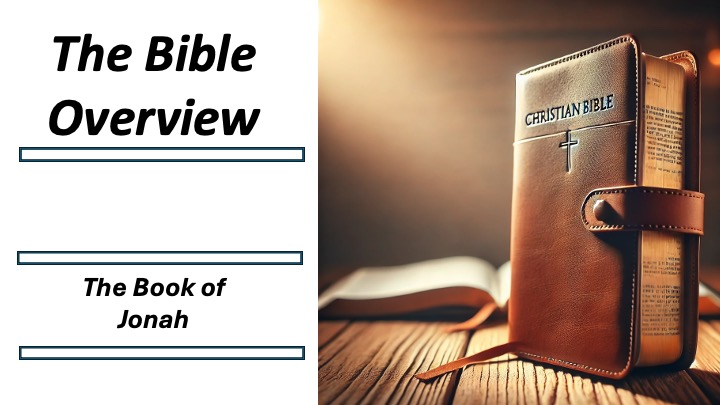Bible Overview Jonah
Mike Ervin

Below is a comprehensive overview of the Book of Jonah, covering authorship, date, themes, chapter summary, and its significance.
1. Authorship of Jonah
Traditional View
• The traditional Jewish and Christian perspective is that Jonah himself wrote the book.
• Jonah is identified as a historical prophet in 2 Kings 14:25, where he prophesied during the reign of Jeroboam II (c. 793–753 BCE).
• Early Jewish tradition (Talmud, Baba Bathra 14b) supports Jonah as the author, possibly writing as an autobiographical account.
Modern Scholarly View
• Many modern scholars question whether Jonah wrote the book and suggest it was written by an anonymous author.
• Reasons for skepticism:
• The book is narrative prose, different from the typical prophetic books, which focus on oracles.
• The highly stylized storytelling (e.g., the great fish, Nineveh’s mass repentance) suggests parable-like features rather than a firsthand prophetic account.
• Some scholars argue that Jonah is not a historical account but a didactic story meant to teach about God’s mercy.
2. Date of Authorship
Traditional View
• If Jonah wrote it, the book would date to the 8th century BCE, during Jeroboam II’s reign (793–753 BCE).
• This would make it one of the earliest prophetic books, around the time of Hosea and Amos.
Modern Scholarly View
• Many scholars date the book much later, between the 5th and 3rd century BCE (post-exilic period).
• Reasons for a later date:
• Linguistic evidence: The Hebrew contains post-exilic Aramaic influences, suggesting a later composition.
• Theological themes: The book challenges ethnocentric attitudes and aligns with post-exilic debates about Gentile inclusion (e.g., Ezra-Nehemiah’s exclusivism vs. Jonah’s universalism).
• Nineveh’s prominence: Nineveh had fallen in 612 BCE, so a late composition (after it was destroyed) suggests the city is being used as a symbol of Gentile repentance rather than a contemporary political reality.
Conclusion: While Jonah was a historical prophet, the book was likely written or finalized during the post-exilic period (5th–3rd century BCE) as a theological reflection.
3. Main Themes of Jonah
A. God’s Mercy and Compassion
• God shows compassion to Nineveh, Israel’s enemy.
• This challenges the idea that God’s mercy is only for Israel.
B. Universalism vs. Exclusivism
• Jonah represents a narrow, nationalistic view (only Israel deserves God’s favor).
• God, however, cares for all nations, not just Israel.
C. Repentance and Divine Forgiveness
• The book shows that even the wicked (Nineveh) can repent and be forgiven.
• This contrasts with other prophetic books, where foreign nations are usually judged rather than spared.
D. God’s Sovereignty Over Creation
• God controls the storm, the great fish, the plant, and the worm.
• These elements symbolize God’s power over nature and history.
E. Human Resistance to God’s Will
• Jonah runs from God but cannot escape.
• His anger at Nineveh’s salvation contrasts with God’s compassion.
4. Chapter-by-Chapter Summary
Chapter 1: Jonah’s Rebellion and the Storm
• God calls Jonah to preach against Nineveh.
• Jonah flees on a ship to Tarshish, trying to escape.
• A great storm arises, and Jonah admits he is fleeing from God.
• The sailors, fearing God, throw Jonah into the sea, and the storm stops.
• God sends a great fish to swallow Jonah, where he remains for three days and nights.
Chapter 2: Jonah’s Prayer from the Fish
• Jonah prays from inside the fish, acknowledging God’s mercy.
• He promises to obey God.
• God commands the fish to vomit Jonah onto dry land.
Chapter 3: Nineveh’s Repentance
• God repeats His command, and this time Jonah obeys.
• Jonah proclaims, “Forty more days and Nineveh will be overthrown!”
• The people of Nineveh, including the king, repent, wearing sackcloth and fasting.
• God sees their repentance and spares them.
Chapter 4: Jonah’s Anger and God’s Lesson
• Jonah is angry that Nineveh is spared.
• He sits outside the city, hoping for its destruction.
• God causes a plant to grow, shading Jonah, then sends a worm to destroy it.
• Jonah is upset about the plant, but God rebukes him:
• “Should I not have concern for Nineveh, in which there are more than 120,000 people?”
5. Conclusion: The Importance of Jonah
A. A Unique Prophetic Book
• Jonah is different from other prophetic books—instead of focusing on prophecies, it’s a story about a prophet.
• It challenges Jewish exclusivism and promotes a more universal view of God’s mercy.
B. Foreshadowing the New Testament
• Jesus references Jonah as a sign of His resurrection (Matthew 12:39-41).
• Jonah’s three days in the fish prefigure Jesus’ three days in the tomb.
• The theme of Gentile inclusion anticipates the New Testament mission to the nations (e.g., Acts 10, where Peter preaches to Cornelius).
C. A Call to Obedience and Compassion
• Jonah’s resistance to God’s mission reflects the human tendency to resist God’s will.
• The book invites self-examination: Are we like Jonah, reluctant to share God’s mercy?
D. Literary and Theological Influence
• The book’s narrative style, irony, and humor make it one of the most engaging biblical stories.
• It remains a powerful teaching tool about God’s love for all people.
Final Thought: The Book of Jonah challenges us to move beyond narrow views of God’s mercy and embrace His love for all nations.